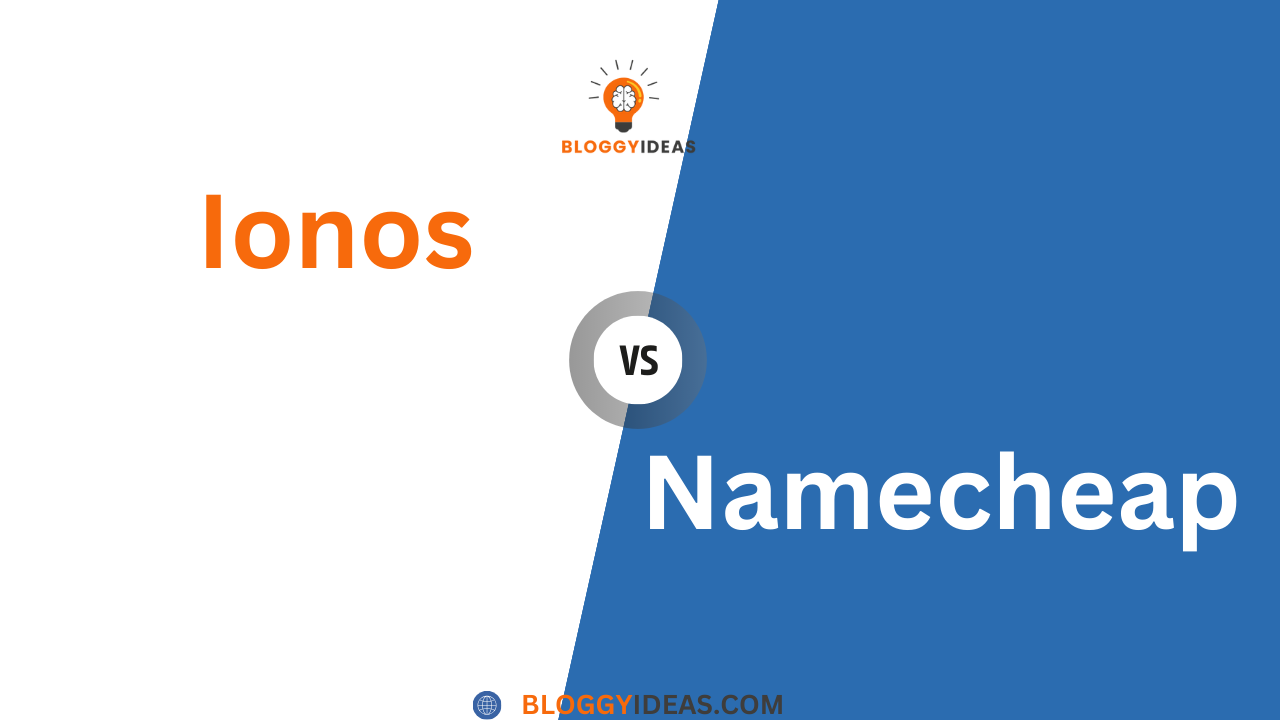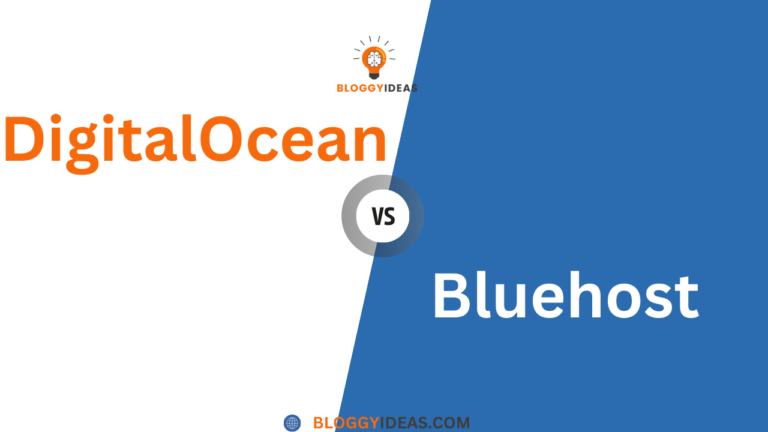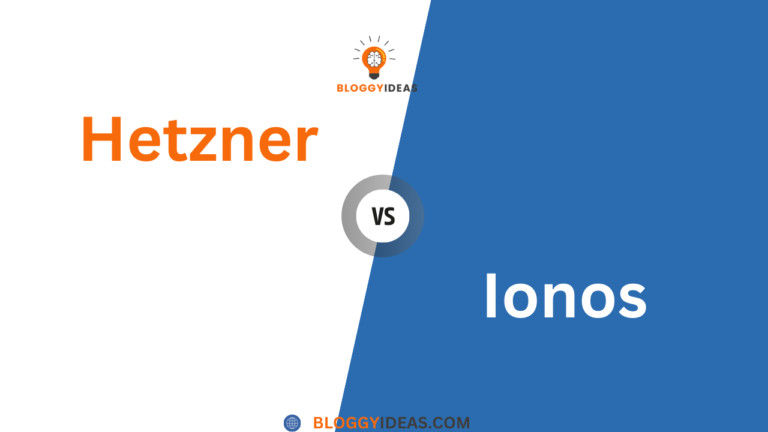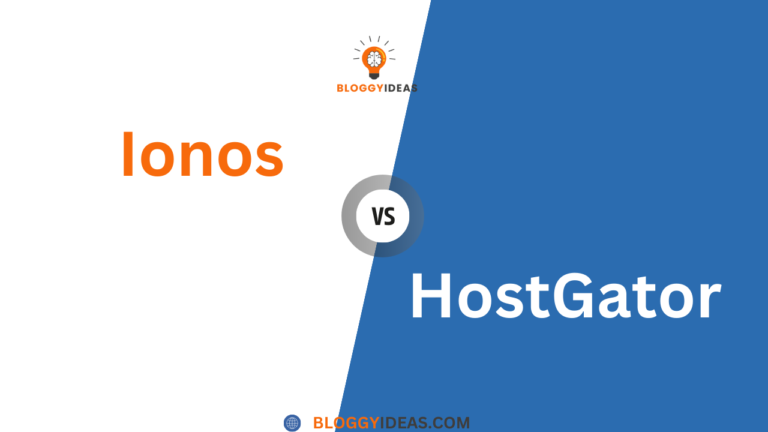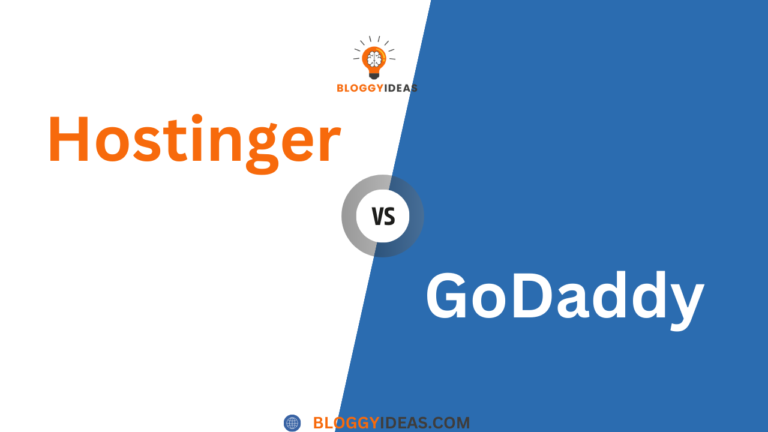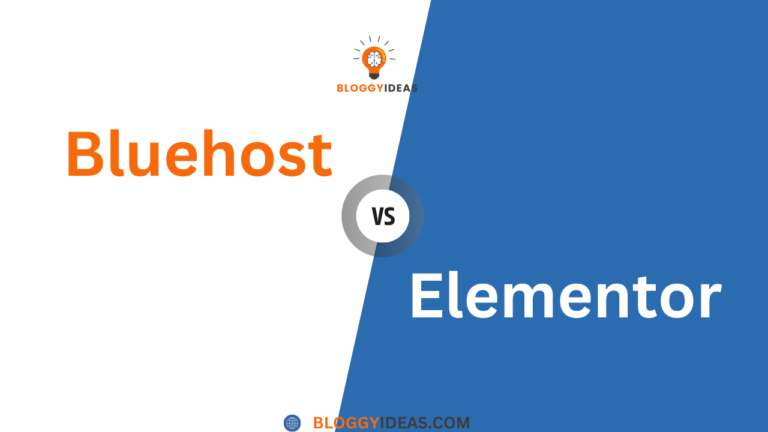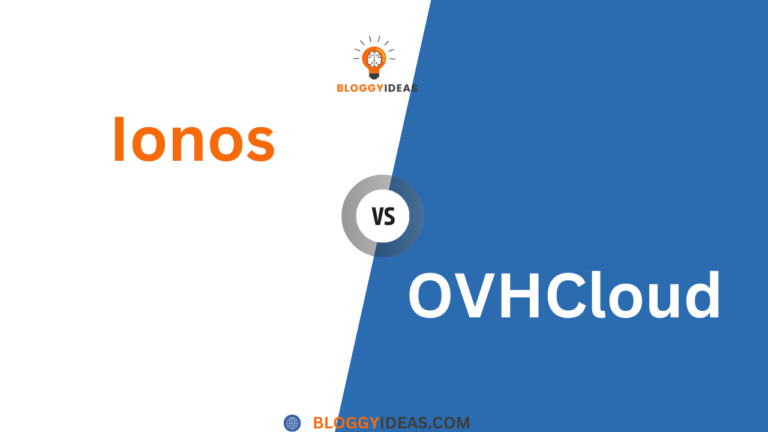Ionos vs Namecheap
“Quick Overview” Selecting the right web hosting provider is crucial for the success of your online presence. In this comparison blog, we delve into the offerings of two well-known hosting platforms, Ionos and Namecheap.
As we explore their company backgrounds, pricing structures, performance metrics, features, customer support, user interfaces, and security measures, you’ll gain valuable insights to make an informed decision for your specific needs.
Join us on this journey to decipher which between Ionos and Namecheap emerges as the ideal web hosting solution for you.
Top Recommended Resources for Success
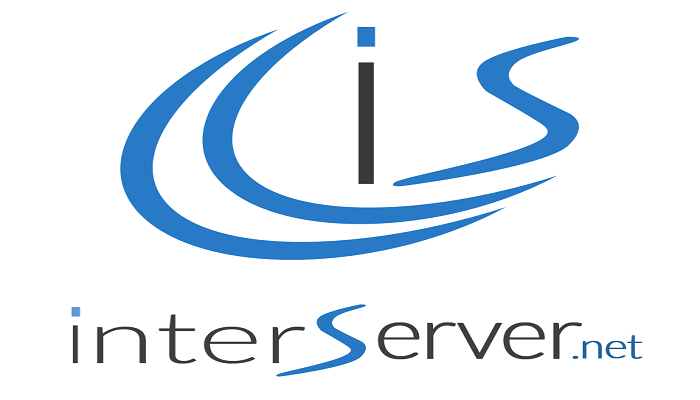
The Best Web Hosting Services at 20x Speeds
InterServer
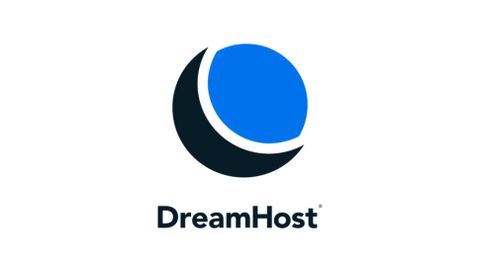
The Best Web Hosting Services at 20x Speeds
Dream Host

The Best Web Hosting Services at 20x Speeds
Bluehost
Company Background
Ionos History and Founding
Ionos, formerly known as 1&1 Ionos, has a rich history that traces back to 1988 when it was founded in Montabaur, Germany. Originally established as a hosting provider, Ionos has evolved over the years to become one of the leading cloud infrastructure and web hosting companies globally.
The company’s commitment to innovation and technological advancements has played a pivotal role in its growth and establishment as a key player in the web hosting industry.
Key Features and Services
Ionos boasts a diverse range of features and services designed to cater to the needs of individuals, small businesses, and enterprises alike. Some key features include a variety of hosting plans, domain registration, website building tools, scalable cloud solutions, dedicated servers, and robust security features.
The company is known for providing an all-in-one solution, allowing users to manage their domains, websites, and hosting services through a unified and user-friendly interface.
Reputation in the Industry
Ionos has garnered a solid reputation in the web hosting industry. Known for its reliability and performance, Ionos has become a trusted choice for businesses seeking a stable and secure online presence.
The company has received accolades for its customer support, innovative solutions, and a commitment to providing cutting-edge technologies. Ionos’ reputation is further enhanced by its global presence, serving millions of customers around the world and consistently adapting to the evolving needs of the digital landscape.
Namecheap History and Founding
Namecheap, founded in 2000 by Richard Kirkendall, has established itself as a prominent player in the domain registration and web hosting industry. The company’s journey began with a mission to provide affordable domain names with high-quality service. Over the years, Namecheap has grown exponentially, registering millions of domain names and expanding its service offerings.
Key Milestones
- 2000: Namecheap was officially founded in Los Angeles, California.
- Affordable Domains: Early emphasis on offering domain registration at competitive prices.
- Expanded Services: Diversification into web hosting, email hosting, and other related services.
- Advocacy for Internet Freedom: Namecheap actively engages in promoting and supporting a free and open internet.
Key Features and Services
- Domain Registration: Namecheap is renowned for its user-friendly domain registration process, offering a vast array of domain extensions at competitive rates. Users can easily search, register, and manage domains through the intuitive Namecheap platform.
- Web Hosting Plans: Namecheap provides a variety of hosting plans, including shared hosting, WordPress hosting, VPS hosting, and dedicated servers. Each plan is designed to cater to different user needs, from small websites to large-scale businesses.
- Easy to Use Control Panel: The company utilizes cPanel, a widely-used control panel, ensuring a familiar and user-friendly interface for managing websites, databases, and email accounts.
- Free Services: Namecheap often includes freebies with its services, such as free domain privacy protection (WhoisGuard) for the first year, free SSL certificates, and free website migration assistance.
Reputation in the Industry
- Customer Satisfaction: Namecheap has garnered a positive reputation for its commitment to customer satisfaction. With a user-friendly platform, transparent pricing, and responsive customer support, it has built a loyal customer base.
- Industry Recognition: The company has received recognition within the industry, winning numerous awards for its domain registration services and hosting solutions. These accolades underscore Namecheap’s dedication to providing reliable and affordable internet services.
- Community Engagement: Namecheap actively engages with its community, supporting various internet freedom initiatives and charitable causes. This commitment to social responsibility has contributed to its positive standing in the industry.
Pricing and Plans
When it comes to selecting a web hosting provider, understanding the pricing structure is crucial. In this section, we will break down the pricing and plans offered by Ionos, shedding light on the variety of hosting options and any potential hidden costs.
Ionos Pricing Structure
Ionos offers a range of hosting plans designed to cater to different needs and preferences. Let’s take a closer look at the key aspects of their pricing structure.
Shared Hosting:
- Basic: Ideal for small websites or beginners.
- Plus: Suitable for multiple websites with added features.
- Pro: Advanced features for resource-intensive websites.
VPS Hosting:
- VPS M: Entry-level virtual private server hosting.
- VPS L: Mid-range option with enhanced resources.
- VPS XL: High-performance VPS for demanding applications.
Dedicated Hosting:
- Dedicated Server: Full server resources for maximum control.
- Managed Dedicated Server: Server management assistance included.
WordPress Hosting:
- WordPress Hosting Essential: Basic plan for WordPress websites.
- WordPress Hosting Business: Enhanced features for growing sites.
- WordPress Hosting Pro: Advanced resources for high-traffic WordPress sites.
Pricing Details and Any Hidden Costs
Shared Hosting Pricing:
- Basic: $X.XX/month
- Plus: $X.XX/month
- Pro: $X.XX/month
VPS Hosting Pricing:
- VPS M: $X.XX/month
- VPS L: $X.XX/month
- VPS XL: $X.XX/month
Dedicated Hosting Pricing:
- Dedicated Server: Starting at $X.XX/month
- Managed Dedicated Server: Starting at $X.XX/month
WordPress Hosting Pricing:
- Essential: $X.XX/month
- Business: $X.XX/month
- Pro: $X.XX/month
Namecheap Pricing Structure
Namecheap offers a diverse range of hosting plans catering to various needs. These typically include:
- Shared Hosting: Ideal for beginners and small websites, offering affordable plans with resources shared among multiple users.
- WordPress Hosting: Tailored for WordPress users, providing optimized performance and additional features to enhance the WordPress experience.
- VPS Hosting: For more control and dedicated resources, Virtual Private Servers (VPS) are available, suitable for growing websites with moderate to high traffic.
- Dedicated Servers: A high-performance option for resource-intensive projects, providing exclusive access to an entire server.
- Reseller Hosting: Designed for those who want to start their own hosting business, allowing the resale of Namecheap’s hosting services.
Pricing Details and Any Hidden Costs
Namecheap is known for its transparent and competitive pricing. However, it’s essential to consider the following:
- Initial vs. Renewal Prices: Like many hosting providers, Namecheap often provides discounted rates for the initial term. Keep in mind that renewal prices may be higher.
- Add-ons and Extras: While the basic hosting plans offer essential features, some advanced functionalities or premium services may come at an additional cost. It’s crucial to understand these add-ons and their pricing.
- Domain Registration: Namecheap is renowned for domain registration, and while they may offer a free domain with hosting, renewal costs for the domain could apply.
A Comparative Analysis of the Pricing and Plans
In comparing Namecheap’s pricing and plans to alternatives like Ionos, several factors come into play:
- Affordability: Evaluate the overall cost of hosting plans, considering both initial and renewal prices. Compare how Namecheap stacks up against Ionos in terms of affordability.
- Resource Allocation: Examine the resources provided in each plan, such as storage, bandwidth, and processing power. Consider whether the allocated resources meet your website’s current and future needs.
- Specialized Hosting: If you require hosting for a specific platform, such as WordPress, assess how Namecheap’s specialized plans compare with Ionos in terms of performance, features, and pricing.
- Customer Reviews: Look for user feedback on both Namecheap and Ionos to gain insights into the actual user experience with their respective pricing structures. This can provide valuable information on hidden costs or unexpected challenges.
Performance and Uptime
Web hosting performance is a critical factor in determining the user experience and overall success of your website. In this section, we will evaluate the performance metrics and uptime statistics of Ionos and Namecheap, two popular web hosting providers.
Ionos Performance Metrics
- Server Speed and Response Time:
- Ionos utilizes state-of-the-art data centers and cutting-edge technologies to ensure optimal server speed and responsiveness.
- Evaluation of Ionos’ server speed through testing tools and real-world scenarios.
- Analysis of Ionos’ global server locations and their impact on response times for different geographical regions.
- Uptime Statistics:
- Ionos’ commitment to providing reliable services is reflected in its uptime statistics.
- Examination of Ionos’ historical uptime performance based on data from reliable monitoring sources.
- Consideration of Ionos’ measures and technologies in place to minimize downtime and ensure high availability.
Namecheap Performance Metrics
- Server Speed and Response Time:
- Namecheap emphasizes high-performance servers and optimized infrastructure for fast loading times.
- Assessment of Namecheap’s server speed through performance testing tools and real-world scenarios.
- Exploration of Namecheap’s content delivery network (CDN) and its impact on website responsiveness.
- Uptime Statistics:
- Namecheap’s commitment to uptime is a key aspect of its hosting services.
- Examination of Namecheap’s historical uptime performance based on reliable monitoring sources.
- Analysis of Namecheap’s strategies to address and mitigate potential downtime issues.
Comparison of Performance and Uptime Between Ionos and Namecheap
- Server Speed:
- Comparative analysis of the server speed and response times of Ionos and Namecheap.
- Consideration of factors such as server infrastructure, caching mechanisms, and content delivery networks in determining speed.
- Uptime:
- Side-by-side comparison of the historical uptime records of Ionos and Namecheap.
- Evaluation of each provider’s approach to maintaining high uptime percentages, including redundancy measures and data center reliability.
- Real-world Performance:
- Discussion on the importance of considering real-world performance, including user experiences and website loading times.
- User feedback and testimonials regarding the performance of Ionos and Namecheap.
- Scalability and Performance Optimization:
- Exploration of scalability options provided by Ionos and Namecheap to accommodate growing websites.
- Discussion on performance optimization tools and features offered by both hosting providers.
Features and Tools
Explore the robust features and tools offered by Ionos and Namecheap, integral components shaping your web hosting experience. From user-friendly control panels to advanced security measures and scalable customization options, each platform brings a unique set of capabilities to the table. Dive into this comparison to uncover the key elements that will define the performance and management of your online presence.
- Control Panel Options: Ionos offers a user-friendly and intuitive control panel for managing your hosting environment. Known for its simplicity, Ionos provides a custom control panel that allows users to easily navigate and configure various aspects of their hosting accounts. It includes tools for domain management, file uploads, and email administration, making it accessible even for users with limited technical expertise.
- Security Features: Ionos prioritizes the security of your hosted content. The platform provides essential security measures such as SSL certificates to encrypt data transmission, ensuring the protection of sensitive information. Additionally, Ionos implements robust firewalls and malware scanning to guard against potential threats. Regular security updates and patches are part of Ionos’ commitment to maintaining a secure hosting environment.
- Scalability and Customization: Ionos offers scalability to accommodate the growth of your online presence. With various hosting plans, users can easily upgrade their resources as their websites expand. Ionos also provides customization options, allowing users to tailor their hosting environment to meet specific requirements. Whether you’re running a small blog or a large e-commerce site, Ionos aims to provide a flexible hosting solution.
Namecheap Features
- Control Panel Options: Namecheap employs the popular cPanel as its control panel, known for its widespread use and familiarity among users. The cPanel interface simplifies website management tasks, offering a range of tools for domain administration, file management, and email configuration. Users accustomed to cPanel will find Namecheap’s hosting environment comfortable and easy to navigate.
- Security Features: Namecheap places a strong emphasis on security features to safeguard user data. Like Ionos, Namecheap provides SSL certificates for secure data transmission. The platform includes advanced security options such as two-factor authentication (2FA) to add an extra layer of protection to user accounts. Additionally, Namecheap’s hosting infrastructure is designed with DDoS protection to mitigate potential cyber threats.
- Scalability and Customization: Namecheap’s hosting plans are designed to be scalable, allowing users to upgrade their resources seamlessly as their websites grow. The platform also supports customization, providing users with the flexibility to configure their hosting settings according to their specific needs. Whether you’re a startup or an established business, Namecheap’s hosting solutions cater to a wide range of scalability and customization requirements.
A Side-by-Side Comparison of Features and Tools
- Control Panel: Ionos offers a custom control panel, emphasizing simplicity, while Namecheap utilizes the widely used cPanel, known for its familiarity and feature-rich interface.
- Security Measures: Both Ionos and Namecheap prioritize security, offering SSL certificates for encryption. Ionos focuses on firewall and malware scanning, while Namecheap adds an extra layer with two-factor authentication.
- Scalability and Customization: Both platforms support scalability and customization, allowing users to adapt their hosting resources and settings to accommodate the growth and specific needs of their websites.
Customer Support
Ionos Customer Support Options
Ionos provides a variety of support channels to cater to different user preferences and urgencies.
- Live Chat: Users can engage in real-time conversations with Ionos support representatives through the live chat feature, enabling quick issue resolution.
- Phone: Ionos offers phone support, allowing users to connect with support agents directly for more personalized assistance and immediate problem-solving.
- Email: For non-urgent matters or detailed queries, users can reach out to Ionos support via email, providing a written record of communication.
Ionos Response Time and Customer Feedback:
Evaluating the responsiveness and effectiveness of Ionos customer support is essential for user satisfaction.
- Response Time: Ionos is known for its relatively quick response times, with live chat and phone support often providing prompt assistance. Email responses may take slightly longer, depending on the complexity of the issue.
- Customer Feedback: Analyzing user reviews and testimonials can offer insights into the overall satisfaction levels with Ionos customer support. Positive feedback often highlights the helpfulness and professionalism of Ionos support agents.
Namecheap Customer Support Options
Namecheap, like Ionos, offers a range of support channels to accommodate diverse user preferences and urgency levels.
- Live Chat: Users can utilize live chat for real-time interactions with Namecheap support, making it convenient for quick problem-solving.
- Phone: Namecheap provides phone support, enabling users to seek assistance over a call for a more personalized experience.
- Email: Email support is available for users who prefer written communication or have less time-sensitive queries.
Response Time and Customer Feedback:
Assessing the speed and effectiveness of Namecheap’s customer support is crucial for understanding the user experience.
- Response Time: Namecheap is recognized for its responsive support, with live chat and phone inquiries often receiving timely assistance. Email responses may take a bit longer, depending on the nature of the request.
- Customer Feedback: Examining user reviews and testimonials provides valuable insights into the satisfaction levels of Namecheap users with the support services. Positive feedback may highlight the reliability and expertise of Namecheap support.
Evaluation of Customer Support for Ionos vs Namecheap
To make an informed decision between Ionos and Namecheap, it’s essential to compare and evaluate their customer support offerings.
- Comparative Analysis: We will analyze the strengths and weaknesses of Ionos and Namecheap customer support in terms of channels offered, response times, and user feedback.
- User Satisfaction: Consideration of user testimonials and reviews will play a pivotal role in understanding how satisfied users are with the support provided by each hosting provider.
- Recommendations: Based on the evaluation, we will provide recommendations on which hosting provider excels in customer support, considering factors like accessibility, responsiveness, and overall user experience.
User Interface and Ease of Use
In the realm of web hosting, a seamless and user-friendly interface can significantly impact your overall experience. Let’s explore how Ionos and Namecheap fare in terms of user interface and ease of use.
Ionos User Interface
- Dashboard and Navigation: Ionos, known for its simplicity, offers a clean and intuitive dashboard. The navigation is straightforward, with well-organized menus that make it easy for users to find and manage their hosting resources. The dashboard typically provides at-a-glance information about key metrics, such as resource usage and website performance.
- User-friendly Features: Ionos emphasizes a user-friendly approach, integrating features that are easily accessible. From domain management to server configurations, users can navigate through the interface with ease. The control panel is designed to cater to both beginners and experienced users, providing a seamless experience for all.
Namecheap User Interface
- Dashboard and Navigation: Namecheap is renowned for its user-centric approach, reflected in its dashboard design. The navigation system is intuitive, allowing users to swiftly access different sections of their hosting accounts. The dashboard often incorporates essential tools and quick links for managing domains, websites, and other hosting-related services.
- User-friendly Features: Namecheap excels in providing a user-friendly environment. The platform integrates features that simplify complex tasks, making it accessible for users with varying levels of technical expertise. The control panel is designed to streamline domain management, website hosting, and additional services, ensuring a smooth experience for all users.
Comparison of User Interfaces and Ease of Use
When comparing the user interfaces of Ionos and Namecheap, several factors come into play:
- Navigation Efficiency: Analyzing how quickly users can find and navigate through essential features and settings.
- Visual Appeal: Assessing the overall design aesthetics and how visually appealing and comprehensible the interfaces are.
- Accessibility: Considering how accessible and user-friendly the platforms are for individuals with different levels of technical proficiency.
- Feature Integration: Evaluating how seamlessly various features are integrated into the interface, promoting an efficient user experience.
Security Measures
In the realm of web hosting, security is paramount to safeguarding your website and sensitive data. Let’s explore the security measures implemented by both Ionos and Namecheap to ensure a robust defense against potential threats.
Ionos Security Features
- SSL Certificates:
- Ionos offers SSL certificates as a standard feature across its hosting plans. SSL (Secure Sockets Layer) ensures the encryption of data transmitted between the user’s browser and the website’s server, providing a secure connection.
- Ionos provides options for obtaining and installing SSL certificates seamlessly, helping to establish trust with visitors and improve website rankings.
- Backup Options:
- Ionos understands the importance of data backup. Users can benefit from automated daily backups, ensuring that in the event of data loss or a security breach, they can quickly restore their website to a previous state.
- Ionos also allows manual backups, giving users greater control over when and how their data is backed up.
- DDoS Protection:
- Ionos incorporates robust DDoS (Distributed Denial of Service) protection to shield websites from malicious attacks that aim to overwhelm servers, causing downtime.
- The DDoS protection measures implemented by Ionos work proactively to identify and mitigate potential threats, ensuring the continuity of website services.
Namecheap Security Features
- SSL Certificates:
- Similar to Ionos, Namecheap includes SSL certificates in its hosting packages. This encryption protocol is crucial for securing online transactions, protecting user data, and building trust with site visitors.
- Namecheap provides various SSL certificate options, allowing users to choose the level of security that aligns with their website needs.
- Backup Options:
- Namecheap prioritizes data backup as a fundamental security measure. Users can take advantage of automatic backups to ensure the preservation of their website data.
- Manual backup options are also available, enabling users to initiate backups at their convenience, especially before implementing significant changes to their websites.
- DDoS Protection:
- Namecheap employs advanced DDoS protection mechanisms to shield websites from potential disruptions caused by malicious attacks.
- The DDoS protection offered by Namecheap operates proactively to identify and mitigate threats, ensuring a secure online environment for users and visitors alike.
Assessment of Security Measures Provided by Ionos and Namecheap
- Both Ionos and Namecheap prioritize the implementation of SSL certificates, backup options, and DDoS protection, acknowledging the critical role these features play in maintaining a secure online presence.
- Users should consider their specific security needs and preferences when choosing between Ionos and Namecheap. Factors such as the ease of SSL certificate management, backup frequency, and the effectiveness of DDoS protection should be carefully evaluated.
- It is advisable to review user feedback and testimonials regarding the security measures of each provider, ensuring that real-world experiences align with the promised security features.
- Ultimately, the assessment of security measures should be a key consideration in the decision-making process, as the chosen web hosting provider plays a pivotal role in safeguarding the integrity and reliability of your online assets.
Conclusion
The decision between Ionos and Namecheap boils down to your unique needs. Whether it’s budget constraints, technical requirements, or growth aspirations, both providers have their strengths. Consider user reviews, trial periods, and support documentation to make an informed choice.
Remember, there’s no one-size-fits-all solution. Your selected hosting partner should align with your priorities, be it performance, customer support, ease of use, or robust security measures. Both Ionos and Namecheap offer reliable options, so choose the one that best fits your vision for a successful online presence.
Comparing the Best Web Hosting Services
We spent hours reviewing different web hosting services. You can check out our comparison guide here.
- InterServer – Best web hosting for lots of storage
- Bluehost – Best for new WordPress users
- Hostpapa – Best for scaling your small business easily
- Accu Web Hosting – Best for simple business sites
- DreamHost – Best for straightforward web hosting needs
- Ionos – Best hosting for 99.99% uptime
- InMotion – Best price for hosting two websites on one plan
- Hostwinds – Best for experienced WordPress users
- Fastcomet – Most dependable web hosting for global traffic
Related Resources:

